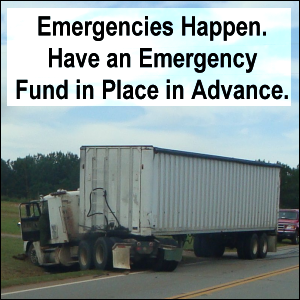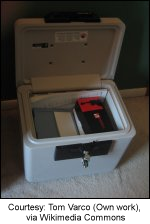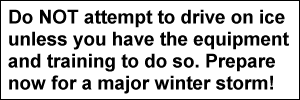All people, especially professional drivers, need an emergency fund to help carry them through difficult circumstances or times of unexpected loss.
 These may include times of
These may include times of
- severe weather (especially in the winter),(1)
- a truck accident,(2) or
- being dumped by a trucking company (like Arrow Trucking did in December 2009).(3)
You may have very little or no warning that such a situation is about to take place, which is why it is wise to be prepared in advance.
Depending on where you are, you may not be able to rely on the generosity of others.
So you must be prepared with an emergency fund for the potential eventuality of financial hardship.
For the purposes of this article, we will discuss only the financial portion of emergency preparedness, the rest of which we intend to cover more fully elsewhere.
Credit and Cash
 Credit may be unavailable (if the power is down) or inaccessible during an emergency.
Credit may be unavailable (if the power is down) or inaccessible during an emergency.
You will want to keep at least enough cash on hand to meet your minimum needs for 72 hours.
If you find yourself stranded such as Arrow truckers were — and needing to get home apart from your truck — you will most likely need a vehicle with enough storage space to transport all of your belongings. (Remember: Don’t abandon a truck.)
Since many of today’s professional drivers make their trucks their homes, we are going to assume the need for a lot of space, and therefore figure on renting a minivan to transport all of one’s belongings.
Vehicle Rental Reality Sets In
 Vicki took the liberty of researching how much money it would take to go the farthest distance in the continental United States for which a rental vehicle (such as one would get at an airport) is available.
Vicki took the liberty of researching how much money it would take to go the farthest distance in the continental United States for which a rental vehicle (such as one would get at an airport) is available.
Using Google Maps and Expedia, she was able to determine that likely extreme locations in the USA are Seattle, WA, and Miami, FL.
The distance from Seattle to Miami by Google Maps’ default route is 3,353 miles.
At the time that Vicki did this research (December 2009) — and for the week of dates she selected (middle of January 2010) — the total price (weekly rate plus other fees and taxes, not including fuel) of renting a minivan one way from Seattle to Miami ranged in price from about $1,600 to $2,400.
(In April 2013, the weekly minivan rental rate ranged from $1,542 to $8,123!)
Of course, much depends upon the rental agency from whom one rents.
 Assuming an average fuel usage of 15 miles per gallon, a 3,353-mile trip would take more than 223 gallons of fuel to complete.
Assuming an average fuel usage of 15 miles per gallon, a 3,353-mile trip would take more than 223 gallons of fuel to complete.
At an average cost of, say, $3.60 per gallon (as of April 2013), that is $803 more.
So, it is safe to say that based on prices around April 2013, one would need up to $8,926 just to drive the trip (not including hotel or motel rooms along the way or the cost of food).
Of course, car rental agencies require customers to use a credit card.
They will not accept cash.
A Truck Fund is Not an Emergency Fund
We’re not suggesting that you take $9,000 in cash with you on the road, although having a truck fund in your vehicle is certainly advantageous for paying for things like scale tickets and tolls (unless your company utilizes PrePass and E-ZPass).
In case you don’t know, a truck fund for operating expenses is not the same thing as an emergency fund.
If you don’t have a credit card that you can tap, we recommend that you get one and keep the line of credit such that you can use it in an emergency.
Standard warnings about credit card usage apply (like always paying off the balance each month so you don’t have to pay interest charges).
Some drivers might prefer to have their money in a Comdata fund instead.
Is an Emergency Fund the Same as an Income Reserve Fund?
Unless you live in a third world country, you cannot survive for very long off the $3,000 target amount that we originally calculated in 2010 just to pay for the trip home.
 In addition to that amount (or line of credit), we strongly recommend that you set aside an income reserve fund to carry you through a period of six months to one year.
In addition to that amount (or line of credit), we strongly recommend that you set aside an income reserve fund to carry you through a period of six months to one year.
Your calculation of how much you need will depend on much you currently spend right now on everything (home, utilities, truck, food, insurance, etc.).
That is, your monthly budget.
Save your reserve and designate it only for use in times of dire emergency.
Some people like putting cash into other investment instruments, but whatever you choose should be easily accessible.
Some people like putting their sensitive financial materials in a fire-resistant safe like the one shown here.
If you are not yet to the place where you have an emergency fund, we recommend that you start setting aside money for one immediately.
 In this day when many truck drivers are losing their jobs, it is more important than ever.
In this day when many truck drivers are losing their jobs, it is more important than ever.
It is wise to have at least six months’ worth of income set aside to get you through a difficulty.
In the event you lose your job, you will probably want to pare back to the bare essentials.
You will want to make a personalized plan that will work for you.
Counting on deprivation may work well for a solo and unmarried driver, but may not work well for a married driver with a family back home.
If you need help with developing a budget, please see our budgeting page.
Conclusion
We recommend that you:
- Be debt free. If you’re still making payments on your truck, endeavor to pay it off as soon as possible.
- Have a reasonable amount of cash on hand at all times (you decide how much).
- Have a credit card with enough of a credit line to handle your reasonable vehicle rental needs in case you need to make an emergency trip home with all of your belongings.
Remember: The sun doesn’t always shine. There are sunny days and rainy days.
The point is: make a plan in advance.
Don’t wait to start an emergency fund.
Even if you can spare only $20 per week, set a goal and work at meeting it.
You can have the best intentions in the world, but if you don’t follow through, it may come back to bite you when you least expect it.
Follow through. You can do it!
If you need it, Mint.com listed 6 steps to starting an emergency fund.
Two compelling thoughts from that article are these:
- Regarding a specific expense: “Ask yourself: If I lost my job, could I still afford this? If you answer ‘no,’ it’s a want—not a need.”
- So that you won’t be tempted to spend it: “Make your money hard to get to.” We just ask: If you’re a trucker who travels away from home for long periods of time, where could you put your money that’s enough out of reach not to spend it in the good times but will be available when you need it?
![]() Money saving tip: Consider the wisdom of paying cash — that is, not paying for things with credit and thus also incurring interest charges — for goods and services during times of loss or unexpected expenses.
Money saving tip: Consider the wisdom of paying cash — that is, not paying for things with credit and thus also incurring interest charges — for goods and services during times of loss or unexpected expenses.
The old saying that “cash is king” comes to mind.
If you have cash, you might even be able to negotiate lower prices on some things.
You can only do this if you have an emergency fund in place.
Return from Your Emergency Fund Protects You from Unexpected Expenses, Loss to our Budgeting page or our Truck Drivers Money Saving Tips home page.
References:
1. newson6.com/Global/story.asp?S=11640701 (no longer online)
2. minnesota.publicradio.org/display/web/2009/12/04/truck-driver-dies/ (no longer online)
3. www.ktul.com/news/stories/1209/689598/ (no longer online)









